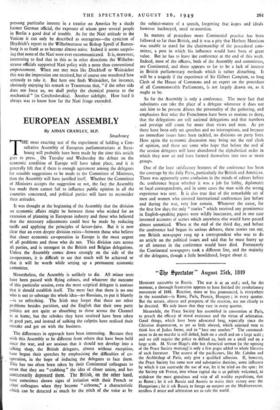EUROPEAN ASSEMBLY
By AIDAN CRAWLEY, M.P. Strasbourg
THE most exacting test of the experiment of holding a Con- sultative Assembly of European parliamentarians at Stras- bourg will probably have been made by the time this article goes to press.. On Tuesday and Wednesday the debate on the economic condition of Europe will have taken place, and it is generally felt that if there is enough agreement among the delegates for sensible suggestions to be made to the Committee of Ministers, then the Assembly will have justified itself. Whether the Committee of Ministers accepts the suggestion or not, the fact the Assembly has made them cannot fail to influence public opinion in all the countries concerned, and political parties will have to reconsider their attitudes.
It was thought at the beginning of the Assembly that the division on economic affairs might be between those who wished for an extension of planning in European industry and those who believed that the necessary adjustments could best be made by reducing tariffs and applying the principles of laisser-faire. But it is now clear that an even deeper division exists—between those who believe that closer economic co-operation in Europe is the most urgent of all problems and those who do not. This division cuts across all parties, and is strongest in the British and Belgian delegations. Unless the Assembly comes down strongly on the side of the co-operators, it is difficult to see that much will be achieved or that it will be worth while setting up a permanent economic committee.
Nevertheless, the Assembly is unlikely to die. All minor tests have been passed with flying colours, and whatever the outcome of this particular session, even the most sceptical delegate is anxious that it should establish itself. The mere fact that there is no one who is out to sabotage the whole idea—no Russians, to put it bluntly —is so refreshing. The Irish may forget that there are other problems besides partition, and the English that their own party politics are not quite so absorbing to those across the Channel 1, at home, but the rebukes they have received have been taken in good part, and instead of sulking the culprits have realised their Toistake and got on with the business.
The differences in approach have been interesting. Because they wish this Assembly to be different from others that have been held since the war, and are anxious that it should not develop into a talking shop, the British delegates, almost without exception, have begun their speeches by emphasising the difficulties of co- operation, in the hope of inducing the delegates to face them. This has too often been taken by their Continental colleagues to mean that they are "crabbing " the idea of closer union, and has unnecessarily depressed them. The British, on the other hand, have sometimes shown signs of irritation with their French or other colleagues when they become " airborne," a characteristic Which can be detected as much by the pitch of the voice as by
the subject-matter of a speech, forgetting that hopes and ideals however hackneyed, need re-assertion.
In matters of procedure more Continental practice has been followed so far than British, and it was a pity that Herbert Morrison was unable to stand for the chairmanship of the procedural com- mittee, a post in which his influence would have been of great value. But he has to leave the conference at the end of this week. Indeed, most of the officers, both of the Assembly and committees, arc Continental, and there appears so far to be a lack of interest in British parliamentary methods which is rather disturbing. It will be a tragedy if the experience of Sir Gilbert Campion, so long Clerk of the House of Commons and an expert on the procedure of all Commonwealth Parliaments, is not largely drawn on, as it ought to be.
So far the Assembly is only a conference. The mere fact that substitutes can take the place of a delegate whenever it does not suit him to be present dilutes the personality of the gathering, and emphasises first what the Frenchmen have been so anxious to deny, that the delegations are still national delegations and that numbers and prestige still count for more than views and men. As yet there have been only set speeches and no interruptions, and because no immediate issues have been tackled, no divisions on party lines. Here again the economic discussion may bring out the real clash of opinion, and there are some who hope that before the end of the session delegates will have abandoned the alphabetical order in which they now sit and have formed themselves into two or more groups.
One of the least satisfactory features of the conference has been the coverage by the daily Press, particularly the British and American. There was apparently some confusion in the minds of editors before the conference began whether it was a job for lobby, diplomatic or local correspondents, and in some cases the man with the wrong experience was sent. It is also true that of the remarkable set of men and women who covered international conferences just before and during the war, very few remain. Whatever the cause, for the first few days the only " stories " which received any prominence in English-speaking papers were wildly inaccurate, and in one case invented accounts of scenes which anywhere else would have passed almost unnoticed. When at the end of the third day, and before the conference had begun its serious debates, these stories ran out, one British newspaper rang up a correspondent who was to do an article on the political issues and said that he must hurry up or all interest in the conference would have died. Fortunately the Continental newspapers took a different line, and the majority of the delegates, though a little bewildered, forgot about it.






























 Previous page
Previous page